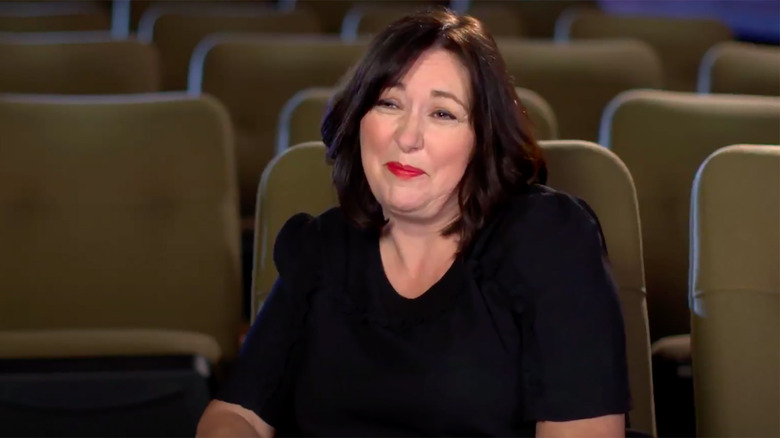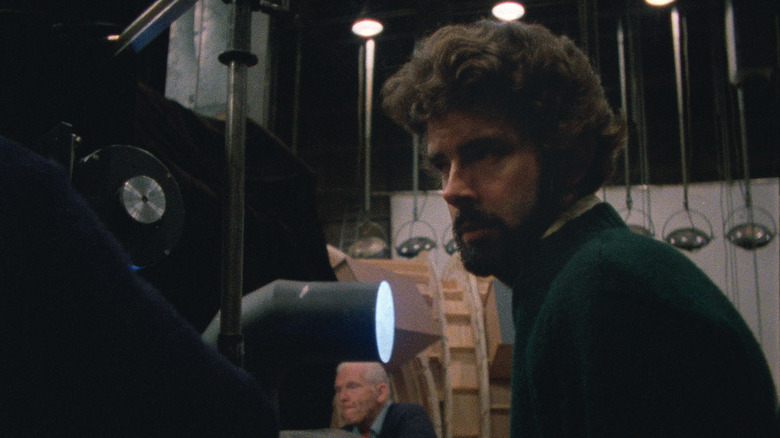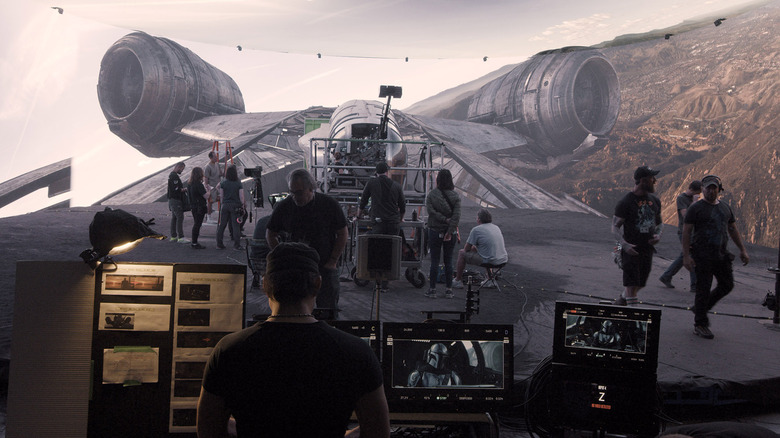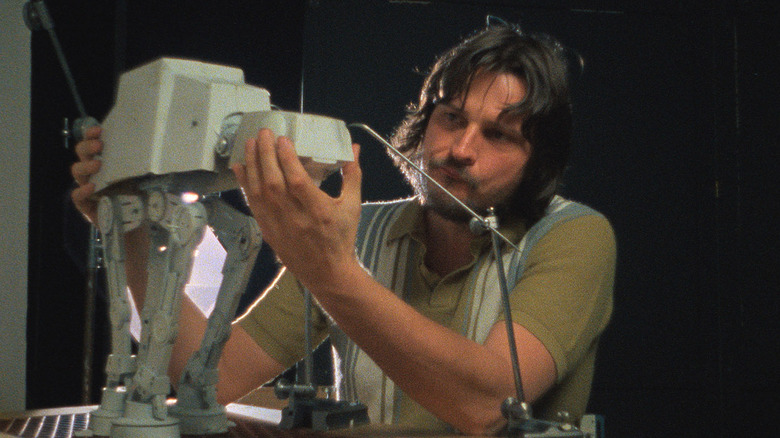Lucasfilm EVP Lynwen Brennan Talks Light And Magic, Challenges Facing VFX, Star Wars, And More [Interview]
"Light & Magic," a new six-part documentary series on Disney+, explores the history, innovation, and movie magic of the visual effects company Industrial Light & Magic (ILM). Filmmaker George Lucas founded the company when he needed a talented group of people to create immersive visual effects for "Star Wars" that no one had ever seen before, and it turned into one of the most renowned visual effects houses in the world.
Leading up to the release of the series, /Film got a chance to speak with Lucasfilm's Executive Vice President and General Manager, Lynwen Brennan. We talked about exactly what Brennan's job entails at Lucasfilm, the biggest challenges facing the VFX industry today, the outcry from overworked VFX artists, the future of "Star Wars," and more. Check out our full interview below.
'I don't think doubt is in the vocabulary within ILM'
This "Light and Magic" series is incredible. This is just exactly the kind of in-depth film nerd stuff that I just can't get enough of. To start with, I think a lot of people would probably be curious to find out exactly what the Executive Vice President and General Manager of Lucasfilm does. The title itself obviously has a head honcho vibe to it, but I just want to know what your day-to-day is like.
[laughs] Well, my day-to-day, I feel like I often say I'm the queen of context shifting, because that is my day-to-day. I'm responsible for all of the Lucasfilm brands across all of the platforms. And I'm also responsible for all the Lucasfilm businesses. So Industrial Light & Magic and Skywalker Sound report in to me. I could be working on an annual operating plan. I'm presenting to Disney one minute, and then the next minute, I'm looking at consumer products plans for "Star Wars" toys. And then the next minute, I'm talking to our ILM team about a project that they're about to take on and some investment that they want to do in R&D. So it's all of the above and it's all fun.
You started at Lucasfilm all the way back in 1999, as George Lucas had just begun his work on the" Star Wars" prequels. As we've seen, those movies spawned so many innovations through ILM. Was there ever any doubt in Lucas' vision for the future of digital filmmaking and other technological leaps? Any skepticism of whether this was actually going to be the future of filmmaking?
I don't think "doubt" is in the vocabulary within ILM, so not internally. But I know that George had some uphill battles that he needed to fight in order to get the industry to embrace his vision, whether that be the filmmaking industry or the exhibition industry. But as usual, with George, when he's got a vision, he's so determined that it's doable. And so for us, for ILM, I remember that strong feeling. There were so many firsts that we were doing on "Episode I," definitely having that feeling of, "Whoa, how are we going to do this?" But never a feeling of doubt that we wouldn't be able to do it or that it wouldn't help tell the story point that George wanted to tell.
'But there isn't a week that goes by at ILM right now where we're not innovating'
With all the technological leaps that VFX have made over the years, especially in a relatively short amount of time, do you feel like the challenges of visual effects departments have changed any at all as the technology has gotten better?
I think it depends, because the visual effects industry is really broad. So there is definitely work that is done that is based on innovations that have come in the past, and it becomes more about executing it and executing it in an increasingly more believable way. Then there is work that has never been done before and requires new innovation. And ILM does a broad spectrum of work. We always look for work that requires some innovation and some boundary pushing. So for us, we've got a good mix. We might be doing a film that has very invisible effects using very well-trodden paths. And then we're doing work that, as I said, has never been done before. StageCraft is a great example of that, for example.
But there isn't a week that goes by at ILM right now where we're not innovating, and we're not a little scared whether we're going to pull it off, but also confident that we're going to pull it off. So there is always something new to be done. There are always things that the industry, in general, hasn't quite nailed, and there is more innovation to make the work more believable. And as I said, we always seek out that type of work. So I don't think there's ever going to be a time where we just kind of rest and just say, "Okay, we've got all the boxes checked."
Is there any particular project you remember being absolutely floored by the visual effects work that was done on it? Something that just completely mystified you and never thought would be possible?
The project that made me determined I was going to work at ILM one day is "Jurassic Park." I remember that moment in the theater and thinking, "That just looks so real, but there's no way it's real," and just wanting to be part of that. Since I've been at the company, oh, there's just so many things that come to mind that when they were brought up, were ideas that you thought, "How are we going to pull this off?" But you have confidence that you will. Then when you see, it's still astounding. So again, I come back to StageCraft. Every time I walk on that volume, it is just unbelievable. Just the fact that we can change context so quickly there. You know you're in The Volume, but your brain is so tricked to believe that it's real. That is the thing that's currently astounding me.
'I think that there is absolutely no doubt that visual effects artists are incredibly talented, incredibly hardworking, and they don't get the credit they deserve'
There's been some talk recently among people who work in the visual effects industry that maybe some of them don't necessarily get the credit they deserve or the payment they deserve when they have to meet such fast and hard deadlines and work such long hours. Since you oversee so much of this stuff, what's your perspective on that growing outcry?
I think that there is absolutely no doubt that visual effects artists are incredibly talented, incredibly hardworking, and they don't get the credit they deserve. A lot of that comes from the fact that — I often say, I feel, in some ways, the industry, because we lean into this idea that it's a magic trick, that these geniuses behind the scenes just make it happen. And we don't necessarily lean into the individuals and the amount of hard work it takes. It's kind of invisible. So I think the more that we can do — like we are doing in a documentary like "Light & Magic," which really celebrates the people — to highlight those individuals, the work that they put into it, and the genius that they have, I think the craft of visual effects will get the recognition it deserves.
One last thing as we wrap up here, what do you think the biggest challenge is facing a franchise like "Star Wars" as it heads into an entirely new era?
That's a great question. One we ask ourselves all the time. I think the wonderful thing about "Star Wars" is it's a gigantic galaxy with thousands and thousands of years of history, so that's a big place to explore. And finding a way that we can explore those different parts, but in a way that is connected, and doesn't feel overwhelming, and that we don't overdo it. Because I think "Star Wars" is also special. So we always want to make sure that, when we're telling a story, it's a story that needs to be told or people want to hear about. I think that's the most important thing, so that when we're telling stories, they have some context and they have a reason for being. Because there's a lot we could do, but I don't think you want to do everything you could do all at the same time. You have to parse it out.
"Light & Magic" is streaming now on Disney+.



